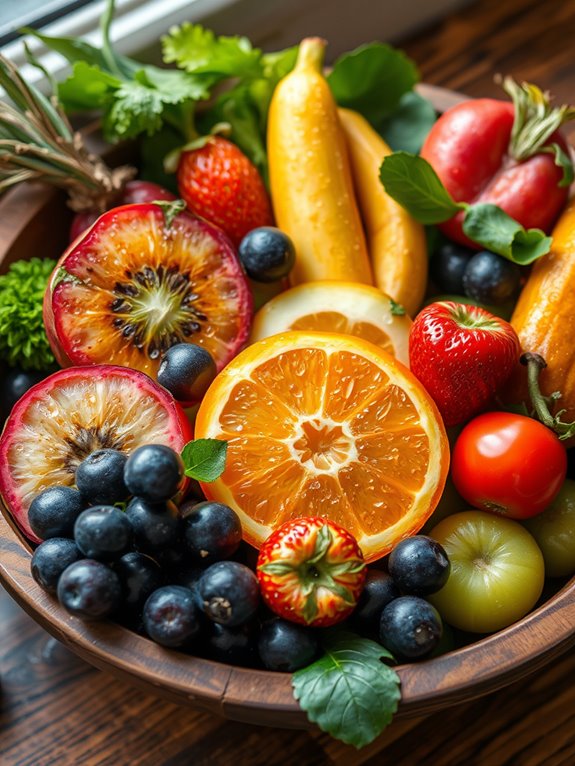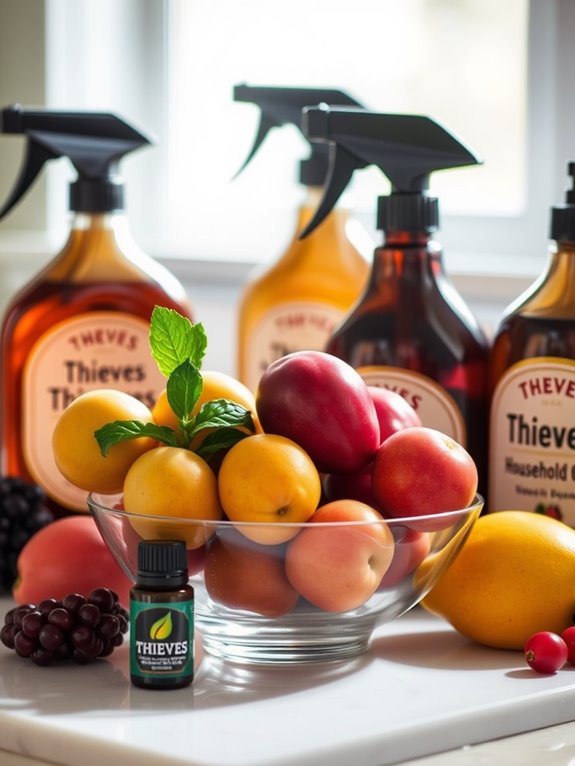You shouldn't use Thieves Household Cleaner on fruit since it contains active ingredients that can leave harmful residues. Even though it's made from natural essential oils, it's still a cleaning product that can pose health risks if ingested. It's best to stick to safe methods for cleaning produce, like rinsing with water or using a vinegar solution. If you want to know more about proper cleaning practices and alternatives, there's plenty more to explore.
Understanding Thieves Household Cleaner Ingredients

When you're looking for an effective cleaning solution, understanding the ingredients in Thieves Household Cleaner can help you make informed choices for your home.
This cleaner features a blend of essential oils, including clove, lemon, cinnamon, eucalyptus, and rosemary. These oils not only provide a pleasant scent but also possess natural antibacterial and antiviral properties.
The base is made from plant-derived surfactants, which help lift dirt and grime without harsh chemicals. With its concentrated formula, you can dilute it for various cleaning tasks, ensuring you're using a safe and effective product throughout your home.
Is Thieves Household Cleaner Safe for Food?
Is it safe to use Thieves Household Cleaner around food?
While Thieves is made from natural ingredients, it's essential to remember that it's still a cleaning product. You shouldn't spray it directly on food or food prep surfaces without rinsing thoroughly. Residual cleaner can pose health risks if ingested.
Always keep in mind the intended use of the product. If you want to clean surfaces where food will be prepared, make sure you follow the proper guidelines to avoid contamination.
Ultimately, prioritize safety and consider using alternative methods specifically designed for cleaning fruits and vegetables.
Best Practices for Cleaning Fruits and Vegetables

To guarantee your fruits and vegetables are safe to eat, it's crucial to follow best practices for cleaning them.
Start by rinsing fresh produce under cool, running water. Use a vegetable brush for firm-skinned items like potatoes and cucumbers. For leafy greens, separate the leaves and rinse thoroughly.
Avoid using soap or commercial cleaners, as they can leave harmful residues. If you're dealing with organic produce, a vinegar solution can help remove dirt and microbes.
Always dry your fruits and vegetables with a clean cloth or paper towel to reduce bacteria. Proper cleaning guarantees you enjoy your produce worry-free!
Alternative Methods for Cleaning Produce
Exploring alternative methods for cleaning produce can enhance both safety and flavor. Instead of relying solely on commercial cleaners, consider using a simple mixture of water and vinegar. Just soak your fruits and veggies in a solution of one part vinegar to three parts water for a few minutes, then rinse thoroughly.
Baking soda is another option; sprinkle it on your produce, scrub gently, and rinse clean. Additionally, a brush can effectively remove dirt and pesticides from sturdy items like potatoes or cucumbers.
These methods are natural, cost-effective, and help you enjoy fresher, cleaner produce without harsh chemicals.
Health Concerns and Precautions

While cleaning produce is essential for your health, it's also important to be aware of potential health concerns and take necessary precautions. Using Thieves Household Cleaner on fruit can introduce unwanted chemicals, which may not be safe for consumption. Always check the label for ingredients and consider the risk of residue.
| Concern | Description | Precaution |
|---|---|---|
| Chemical Residue | Harmful substances may linger | Rinse thoroughly with water |
| Allergic Reactions | Sensitivities to ingredients | Test on small area first |
| Cross-Contamination | Bacteria transfer from surfaces | Use separate cleaning tools |
Recommendations for Safe Food Handling
When it comes to handling food safely, proper cleaning techniques are essential.
You should always wash fruits thoroughly and keep your kitchen surfaces sanitized.
Following safe food practices not only protects your health but also enhances your overall cooking experience.
Proper Cleaning Techniques
To guarantee safe food handling, it's vital to adopt proper cleaning techniques that prevent cross-contamination.
Always wash your hands with soap and water before handling food. Use separate cutting boards for fruits and vegetables to avoid mixing with raw meat or dairy products.
Rinse fruits under cold running water, scrubbing surfaces as needed. If you must use any cleaner, make sure it's food-safe and rinse thoroughly afterward.
Keep your kitchen surfaces clean by regularly sanitizing them with safe solutions.
Safe Food Practices
Understanding safe food practices is essential for preventing foodborne illnesses and ensuring the well-being of your family.
Here are four key recommendations to keep in mind:
- Always wash your hands with soap and water before handling food.
- Rinse fruits and vegetables under running water, even if you're peeling them.
- Use separate cutting boards for raw meat and produce to avoid cross-contamination.
- Store perishable items in the refrigerator within two hours to prevent bacteria growth.
Conclusion
In the colorful world of fresh produce, your health is the brightest treasure. While Thieves Household Cleaner boasts a blend of natural ingredients, it's best to steer clear of using it on your fruits and veggies. Picture a vibrant apple, glistening in the sunlight—cleaning it with harsh chemicals could dull its shine and compromise your well-being. Stick to safer methods, and savor the crispness of your clean, chemical-free fruits, knowing you've chosen wisely for your health.

I’m Allen Kim, the chief editor of plumbinginto. I am a mid level plumber and assign to an local firm over 4 years of experience. During the working period, most of my experience is related to the house plumbing. I learned about the thing, when working with most experienced people in this sector, one must be as good as the inspector or better with knowledge of the project as well as the practical aspects of plumbing industry.